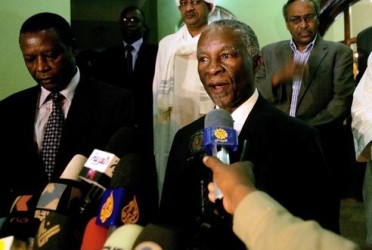Sudan and South Sudan agree to continue talks despite recent tensions – mediation
July 21, 2012 (KHARTOUM) – African Union (AU) mediators announced on Saturday that Sudan and South Sudan have agreed to continue negotiations over unresolved issues as scheduled, twenty four hours after Juba’s decision to suspend the talks.

Khartoum’s delegation denied the accusation, saying it conducted a military operation inside the Sudanese territory against a column of Darfur rebel vehicles who crossed into the western part of country from the neighbouring South Sudanese Bahr el-Ghazal region.
The AU High-Level Implementation Panel (AUHIP) led by former South African President, Thabo Mbeki said on Saturday that Sudanese and South Sudanese negotiators agreed to remain in the current round of talks in order to meet the 2 August deadline set by the UN Security Council’s (UNSC) resolution number 2046.
“The Parties agreed to continue their negotiations without interruption, bearing in mind that, as confirmed by the AU PSC Roadmap and UNSC Resolution 2046,” the mediation announced in a statement released on Saturday afternoon.
“They meet under the auspices of the AUHIP,” the statement underlined.
The two parties have sealed this month a strategic framework to resolve the outstanding issues through comprehensive and direct talks. The mediation has just been informed of the outcome of their closed door meetings.
The recent encounter between presidents Salva Kiir and Omer al-Bashir on the sidelines of the African Union summit in Addis Ababa was one of the things agreed in the framework. The meeting raised hopes that the two parties, exhausted by the conflict and economic crisis, might finally reach a deal.
The return to the initial formula of discussion brokered by the mediation might allow the mediation to speed up negotiations, if it puts forward propositions reconciling the expectations of the two sides.
It is not clear, however, how the panel will deal with the issue of the buffer zone, as Khartoum still rejects the map it proposes to use to operationalise the buffer zone, which is seen as a key element in the set of security arrangements.
The mediation, after holding talks with the top negotiators from both sides, also stated that it will investigate the claims of both parties.
“The AUHIP has informed the Parties that it will immediately take steps to establish the truth concerning the matters referred to above”, says the statement.
Sudan and South Sudan leaders, during their meeting of 14 July, agreed on the need to meet the deadline of 2 August, as provided in the UN Security Council decision 2046. They also pledged to strengthen bilateral ties and enhance economic and trade relations.
The encounter was seen as positive and encouraging by both parties, whilst the international community hailed the move, hoping the two parties will turn the page on suspicions and mistrust and build a solid partnership in the interest of their two nations.
Observers say that the new developments might lead the international community to put more pressure on the two countries in order to conclude the process.
“We need bold decisions from both parties as they discuss these issues since more than a year and they know well where they diverge and where they agree”, said a western diplomat who preferred to keep anonymity.
The mediation is preparing to hold a second Bashir-Kiir presidential summit, where it is expected to submit them a series of proposals to resolve the outstanding issues. Earlier this month, the mediation put forward a nonbinding paper to the two sides, including a number of propositions on the issues being discussed, which include: borders, disputed areas, oil, citizenship, trade, assets, and international debt.
(ST)
